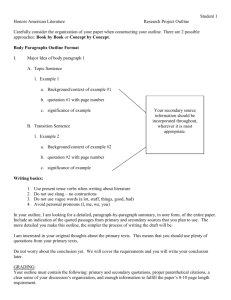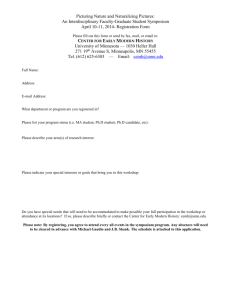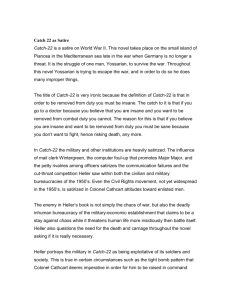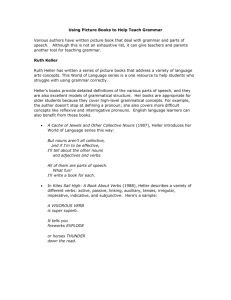Final Essay Example
advertisement
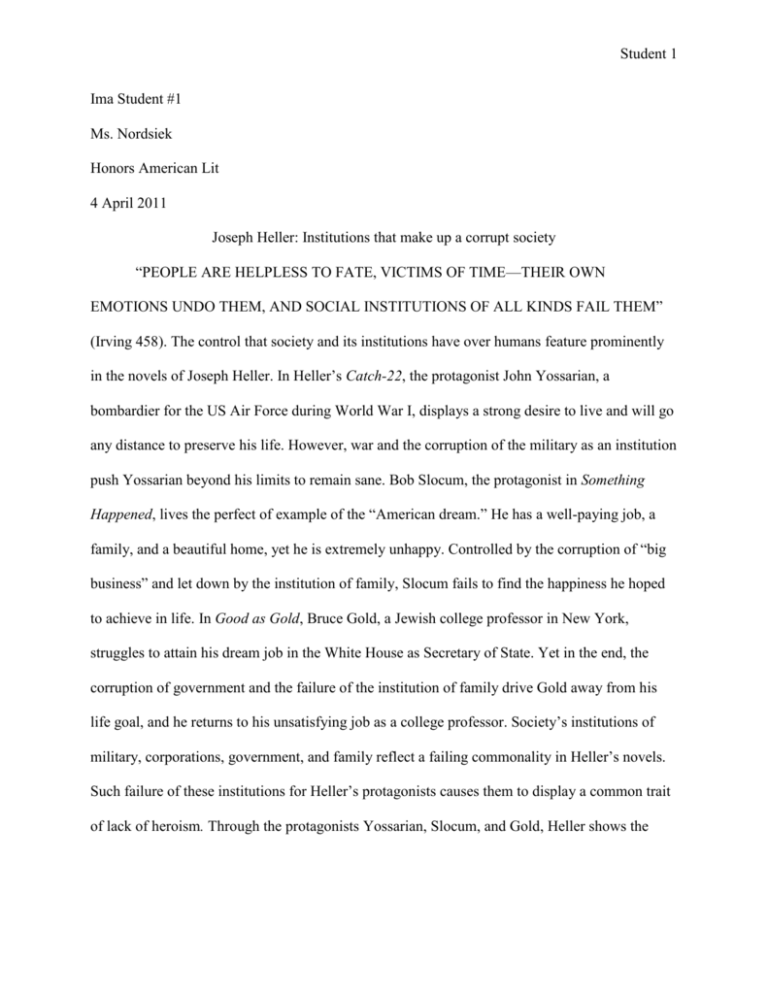
Student 1 Ima Student #1 Ms. Nordsiek Honors American Lit 4 April 2011 Joseph Heller: Institutions that make up a corrupt society “PEOPLE ARE HELPLESS TO FATE, VICTIMS OF TIME—THEIR OWN EMOTIONS UNDO THEM, AND SOCIAL INSTITUTIONS OF ALL KINDS FAIL THEM” (Irving 458). The control that society and its institutions have over humans feature prominently in the novels of Joseph Heller. In Heller’s Catch-22, the protagonist John Yossarian, a bombardier for the US Air Force during World War I, displays a strong desire to live and will go any distance to preserve his life. However, war and the corruption of the military as an institution push Yossarian beyond his limits to remain sane. Bob Slocum, the protagonist in Something Happened, lives the perfect of example of the “American dream.” He has a well-paying job, a family, and a beautiful home, yet he is extremely unhappy. Controlled by the corruption of “big business” and let down by the institution of family, Slocum fails to find the happiness he hoped to achieve in life. In Good as Gold, Bruce Gold, a Jewish college professor in New York, struggles to attain his dream job in the White House as Secretary of State. Yet in the end, the corruption of government and the failure of the institution of family drive Gold away from his life goal, and he returns to his unsatisfying job as a college professor. Society’s institutions of military, corporations, government, and family reflect a failing commonality in Heller’s novels. Such failure of these institutions for Heller’s protagonists causes them to display a common trait of lack of heroism. Through the protagonists Yossarian, Slocum, and Gold, Heller shows the Student 2 failure and corruption of society’s institutions in twentieth century America and the lack of heroic qualities that such institutions cause. Society’s institution of the military reflects John Yossarian's corruption in Catch-22. In order for Air Force officers to return home from the war, they must fly a certain amount of missions. But once an officer flies his missions, in particularly Yossarian, Colonel Cathcart, the officer in charge of Yossarian’s squadron, raises the number of missions so no one may return home. This idea of endless trickery is called Catch-22. Heller explains Catch-22, “There was only one catch and that was Catch-22, which specified that a concern for one’s own safety in the face of dangers that were real and immediate was the process of a rational mind” (52). Heller describes the institution of the military as a trap. The creation of Catch-22 prevents soldiers from returning home from the war, in particularly those who have flown their missions and have earned their right to leave. Furthermore, the Air Force’s mess officer, Milo Minderbinder’s chocolate covered cotton balls symbolize Heller’s view of the military. After a deal in Cairo to trade cotton balls for food items fails to go through, Milo Minderbinder is left with a massive supply of cotton balls. In attempts to get rid of them, Milo covers the cotton balls in chocolate in hopes to feed them to the army. Heller writes, “He unwrapped tissue paper from something soft, round and brown and handed it out to Yossarian. […] Yossarian gagged convulsively and sprayed his big mouthful of chocolate-covered cotton right out into Milo’s face” (245). The chocolate covered cotton balls symbolize the army in that they appear good on the outside (the chocolate), but are bad on the inside (the cotton). Literary critic Darren Felty states, “His satire targets not just the military but all regimental institutions that treat individuals as cogs in a machine. His central character, Yossarian, recognizes the insanity of social institutions that Student 3 devalue human life” (106). Yossarian and his involvement with such a fraudulent military reflect Heller’s negative view of society. The institution of big business illustrates corruption in society as shown by the protagonist Bob Slocum in Something Happened. Slocum’s co-worker, Phillip Reeves, confides in Slocum about their boss, Jack Green. Slocum’s corrupt nature convinces Reeves to trust him. Slocum narrates, “Reeves confides in me because he thinks I am capable, honest, and unpretentious; he knows I drink and lie and whore around a lot, and he therefore feels he can trust me” (44). Such corruption viewed in a positive manner implies that drinking, lying, and sleeping around commonly happen in the office. Reeves’s trust in Slocum because of Slocum’s lack of morality reflects Heller’s view of dishonesty in institutions. In addition, Slocum speaks of adultery in the office as if it were the norm. Slocum explains, “The company has a policy about getting laid. It’s okay. […] But getting laid with somebody else’s wife is very okay, and so is talking about it, provided the husband is not with the company or somebody anybody knows and likes” (66). Slocum’s simple statement of the “rules” of sleeping around further reflect adultery in the office, or any setting, to be as ordinary as conversing with another person. Adultery or “getting laid” seems to be the main topic of conversation whenever Slocum is in the office. Heller shows such distraction from work to further stress corruption in society’s institutions. Felty says, “Rules of such large institutions, Heller suggests, often exist for their own sake, not for a good reason” (98). The institution of big business exists in Heller’s novel not for the good of society, but for personal gain or mere amusement of its workers. The institution of government demonstrates corruption and failure in society through the character Bruce Gold in Good as Gold. Gold’s friend in the White House, Ralph Newsome, wants to help Gold find the job of his dreams as Secretary of State. Even though Gold is well- Student 4 educated, he feels insecure about getting the job because he feels he has not had enough government experience. Ralph responds to Gold’s question of needing enough experience to be Secretary of State, “‘Absolutely not,’ Ralph answered, and appeared shocked that Gold should even ask. ‘In government, Bruce, experience doesn’t count and knowledge isn’t important’” (118). Such neglect in the selection of a country’s own government representatives gives the government as an institution a poor reputation in society. Moreover, the President of the United States in the novel never appears to be performing his proper duties as Commander in Chief. Heller writes, “The appointment was cancelled. The President was asleep. […] ‘The President,’ Ralph explained, is a very early riser. He is up at five every morning, takes two sleeping pills and a tranquilizer, and goes right back to bed for as long as he can sleep’” (203). Heller further mocks the government by having a dormant and completely inactive President. Such a poor and negative attitude towards the government contributes to Heller’s belief of corruption in society. Literary critic Walker Rutledge says, “With Good as Gold, Heller initially seems to be scrutinizing the world of Washington in the same way he examined the military and the business community in his first two novels.” Just like in Catch-22 and Something Happened, Heller places his protagonist in Good as Gold in a specific institution, the government, to emphasize his perception of a fraudulent society. The failure of the institution of family for Bob Slocum in Something Happened portrays further corruption in society in contemporary America. Slocum and his family symbolize Heller’s view of the typical family of twentieth century America. Slocum’s wife says, “Let’s try not to fight tonight. Let’s see if we can’t get through just one meal without anybody yelling and screaming and getting angry. That shouldn’t be too hard, should it?” (109). The constantly quarrelling Slocum family lacks the love and protection an ordinary family would normally have. Student 5 Through the state of the Slocum family, Heller shows that the world associates "families" with conflict and anger, no longer love and protection. Furthermore, Slocum’s constant battle with his daughter contributes to Heller’s representation of the no longer loving family. Slocum and his daughter have the most argumentative relationship in the Slocum family. Slocum narrates, “As [my daughter and I] go through the formalities of pretending to be still related. […] I talk to her, buy her things, and will continue to profess to be interested in her until she is old enough to go away to college or move away somewhere else, as she never ceases stressing she wishes to do” (184). Slocum shows no protest to his daughter's impending departure. The poor relationships in the Slocum family further support Heller’s view of the corrupt family, which, in turn, maintain Heller’s negative outlook on society. The institution of family suggests corruption in society as portrayed through Bruce Gold and his family in Good as Gold. Gold has an unhealthy relationship with his father for almost all of Gold’s life. Gold’s father is ashamed of Gold and always criticizes Gold, which sparks constant conflict between the two. Heller writes, “It was no secret to anyone that his father considered Gold a schmuck. It would be unfair to say his father was disappointed in him, for he had always considered Gold a schmuck” (31). The father-son relationship is often very strong, and Heller criticizes the family by contradicting this relationship. At a certain point Gold’s father stopped loving Gold, representing the loss of love in twentieth century families. In addition, Gold’s twelve-year-old daughter talks disrespectfully to her father with no sense of authority. Gold’s daughter says to Gold, “Balls, Dad. Listen, you better be goddamned careful what you put in any more articles you write. That crap on child rearing you had in the Ladies’ Home Journal last year didn’t do me no good” (131). By already showing the loss of love in the family, Heller further mocks the family with his total lack of respect between Gold and his daughter. Student 6 The corruption of society’s institutions drives Heller’s protagonists to anti-heroism, evident in Yossarian in Catch-22. Yossarian’s reluctance to fight in the war comes from his strong desire to live and his unhappiness in the army. Felty states, “Yossarian is certainly not courageous: he will do anything to get out of the combat, even fake illness. He’s not selfless; in fact, he’s obsessed with saving himself from danger” (99-100). Yossarian rebels against fighting for a just cause in World War II against the evil empire of Nazi Germany. His desire to survive is stronger than his willingness to fight for the wellbeing of others. Moreover, the insanity and corruption of the military makes Yossarian flee a fraudulent society instead of trying to fix it. Felty states, “Heller portrays life for the men in the squadron as completely crazy. They are at the mercy of ambitious commanders who care more about their own careers than the men’s lives” (99). Yossarian, a weak protagonist in a harsh and crooked institution, emphasizes the corruption in society and non-heroic qualities that emerge from such an institution. The protagonist Slocum in Something Happened indicates Heller’s use of anti-heroism as a result of corrupt institutions. Slocum has a decent family, a nice house, and a well-paying job, but ungratefulness strains him from being happy. Such ungratefulness, originates from Slocum’s corrupt family, which drives Slocum to the corruption of business to avoid returning home. Slocum narrates, “My wife is the only wife I could have had till now (I had no choice) till death, divorce, or adultery do us part” (403). Slocum stays at work in order to avoid his wife and children. At work, he has naught but adultery to resort to keep him “happy.” Such weakness and disloyalty, which the corruptions of the institutions of family and business have caused, display a non-heroic commonality in Slocum. Furthermore, Slocum’s inability to accept imperfection in society contributes to Heller’s view of anti-heroism. Slocum’s youngest son, Derek, is mentally retarded. For this reason, Slocum (nor the rest of the Slocum family) can accept him. Slocum Student 7 narrates, “I no longer think of Derek as one of my children. […] the children don’t care for him, either. No one really cares for him” (131). Such inability to accept imperfection in society branches from the corruption of society in general. Heller shows that society no longer has room for imperfect ideas or beings, reflecting its long-standing corruption. Heller’s protagonist Gold in Good as Gold displays anti-heroic qualities as a result of the failure of societal institutions. Gold desperately wants to be the only Jew (other than Henry Kissinger) to be the U.S. Secretary of State, and he willingly goes to high limits to achieve his goal. Rutledge from Twentieth Century Young Adult Writers says, “Heller’s purpose is to satirize those individuals, Jews and Gentiles alike, who renounce their cultural and religious heritage in order to be assimilated into the power elite.” The corruption of the government pushes Gold to relinquish his own cultural identity to gain more power. Gold is power-hungry, just like all of the other members of government, according to Heller. In addition, as a college professor, Gold fails to be a good mentor for his students. He is unhappy as a college professor seeing as his dream job is to work for the White House. The government and what it has to offer Gold personally blind him, and he completely disregards his duties as a college professor. Gold talks to one of his students, “‘You were mislead,’ said Gold. ‘If I were your adviser I would have forewarned you.’ ‘You are my adviser,’ said the boy, ‘and you’re never in your office’” (134-135). Gold, a teacher and a mentor, is not supportive of his students. Heller uses Gold’s position as a college professor to stress the corruption in school systems as well. The protagonists Yossarian, Slocum, and Gold reflect Heller’s portrayal of the failure and corruption of society’s institutions, and the non-heroic qualities they cause, in twentieth century America. Heller’s reflection of the fraudulence of the military, the deceitfulness of businesses, the dishonesty of the government, and the unfaithfulness of the family contribute to society’s Student 8 corruption. Heller emphasizes the tragic flaws of society’s institutions by giving his protagonists anti-heroic qualities caused by the corrupt institutions. Mariana Cook in the Critical Survey of Long Fiction says, “the means by which institutions in the modern world coerce the individual and the way in which individuals—such as Slocum and, until his turnabout, Gold become coconspirators in their own demise.” The interaction between Heller’s protagonists and their respective institutions lead them to their own downfall. The commonality of Heller’s protagonists and their involvement with demoralized institutions reflects his negative viewpoint towards American society. Every society is like a jig-saw puzzle where each individual piece, the institutions themselves, creates one big picture, the society as a whole. The backward institutions that function within American society in the twentieth century create a foundation of an extremely dishonest and corrupt society. Student 9 Works Cited Cook, Mariana. “Joseph Heller.” Critical Survey of Long Fiction, Second Revised Edition. Literary Reference Center. EBSCO, 2007. Web. 30 Jan 2011. Felty, Darren. "Joseph Heller Overview." Novels for Students. Ed. Sara Constantakis. Vol. 29. Detroit: Gale, 1997. 97-108. Print. Heller, Joseph. As Good As Gold. New York: Simon & Schuster, 1997. Print. ---. Catch-22. New York: Simon & Schuster, 1996. Print. ---. Something Happened. New York: Simon & Schuster, 1997. Print Rutledge, Walker. “Joseph Heller: Overview.” Twentieth Century Young Adult Writers, 1st ed. 1994. Literature Resource Center. Gale. Web. 07 Feb 2011. Student 10
